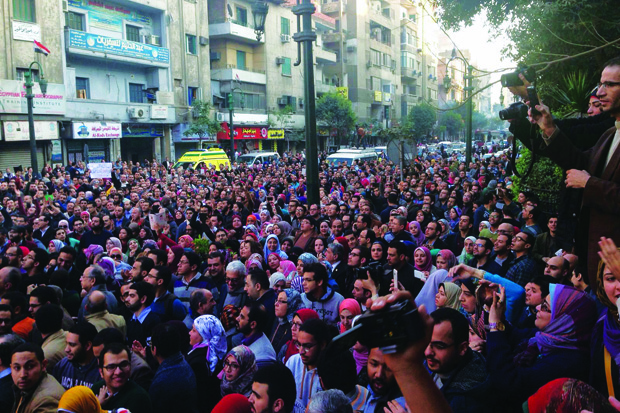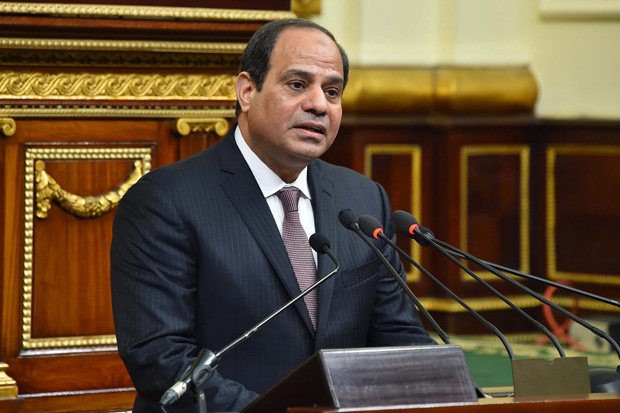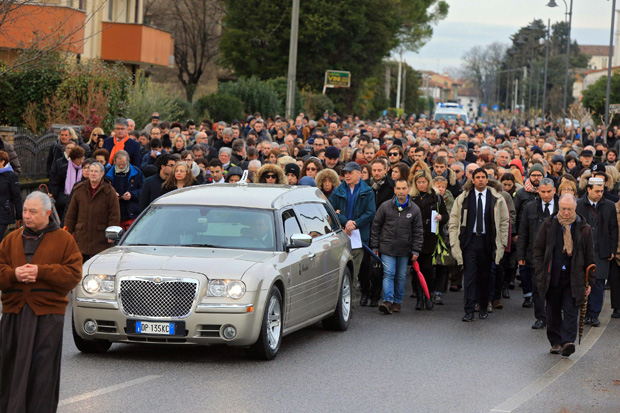compiled by Ahmed Goher
Cabbies in Arms
Taxi drivers in Egypt erupted in anger as private taxi services Uber and Careem continue to gain popularity in the country. Fearing the competition, the taxis launched protests and demonstrations against the companies and called on the government to ban the services. While some riders voiced support for taxis, others were less sympathetic, noting that the bad services provided by regular cabs is prompting riders to seek alternatives.
“There is an organized campaign against us on social media to portray us as horrible drivers who are sexual harassers with rigged taximeters.” —Sherif El-Sayed, a taxi driver speaking at a press conference against Uber and Careem.
“Getting in a taxi in Egypt as a woman, you never know what you’re getting into. I’ve had taxi drivers jerk off or show me their [private parts] and tell me all kinds of exceptionally inappropriate things while they were supposed to be just driving me from A to B. I felt unsafe in taxis so many times, but never with Uber.” —Frequent Uber user Yasmine Hawary to local press.
“With many people losing jobs due to the decline of the tourism industry, we offer an opportunity. … You have a car, you get a job. … In the past, you either had bad quality service for a low price or good quality service for a very high price. Careem aims to offer good service for an affordable price.” —Hadeer Shalaby, Egypt’s general manager of Careem, to Al-Monitor.
Policing the Police
A spate of incidents over the past month have once again brought police brutality under the spotlight in Egypt. One incident that drew considerable public outcry involves a policeman shooting dead 24-yearold driver Mohamed Ali Ismail in a busy street after a dispute over his fare. According to a statement by the Interior Ministry, following the shooting Ismail’s friends and family beat up the policeman, leaving him with serious injuries. The policeman was then transferred to a hospital and is now facing investigations by the Interior Ministry. Meanwhile, immediately following the shooting hundreds of protestors gathered in front of the Cairo Security Directorate to condemn the shooting and the Interior Ministry.
The shooting comes hot on the heels of another incident of police brutality which involves two doctors who were allegedly beaten in Al-Matariya Hospital, after one of the doctors told a police officer that his injury does not require stitches. The beating prompted thousands of demonstrators to gather outside the Doctors Syndicate to protest against the Interior Ministry and demand the police officer be held accountable. As tensions flared, President Abdel-Fattah al-Sisi’s office released a statement in which he told Interior Minister Magdy Abdel Gaffar that abuses have been carried out by a “number of policemen” and that “these actions must be stopped and the perpetrators held to account” through “legal amendments, or new laws, that regulate police performance on the street, and that ensure all who violate the rights of citizens will be held to account.”
While most voices have condemned the violence and called for any offenders to be held accountable, some view such incidents as isolated actions by lone officers that are exploited and blown out of proportion by enemies of the state.
“There is an outrageous smear campaign against us now, but it will not stop us from demanding our rights.” —Khaled Samir, member of the Doctors Syndicate, to local news.
[caption id="attachment_466461" align="alignnone" width="620"] Doctors demonstrating against police brutality.[/caption]
Doctors demonstrating against police brutality.[/caption]
“He took out his weapon and loaded it. We intervened to restrain him and tried to break up the fight, but he was able to break loose and immediately shot him in the head.” —Mohamed Samir, a witness to the shooting of the driver, to local press.
“The Interior Ministry will be the one responsible for translating President El-Sisi’s orders into proposed legislative amendments … as far as I understand, the proposed amendments should be presented to parliament within 15 days. … However, I do not think that these amendments will include referring police personnel to military trials because this goes against the new constitution and because military trials apply to the military and central security forces only.” —Minister of Parliamentary Affairs Magdi El-Agati at a press conference.
“While we highly appreciate that policemen sacrifice their lives fighting terrorism in Sinai and other Egyptian governorates, we also warn that arbitrary practices by the security apparatus could tarnish the image of the Interior Ministry as a whole,” —MP Abdel-Wahed to Al-Ahram.
“My advice to Minister Abdel-Ghaffar is that if you are not able to contain the arbitrary practices of the security apparatus, it is better that you and other ministry officials submit you resignation and before things get out of control.” —MP Anwar Al-Sadat to Al-Ahram.
“[Police abuses] must be stopped and the perpetrators held to account. … This may require some legal amendments, or new laws, that regulate police performance on the street, and that ensure all who violate the rights of citizens will be held to account.” — President Sisi to the Interior Minister in a statement.
[caption id="attachment_466460" align="alignnone" width="620"] President Sisi has called for new legislation to tackle police abuses.[/caption]
President Sisi has called for new legislation to tackle police abuses.[/caption]
“This is a turning point in our union’s history. … We want the rule of law. Assaulters, whether they are a doctor or a policeman, must be punished.” —Hussein Khairy, chairman of the Doctors Syndicate, to demonstrating doctors.
“I can’t treat a patient while a gun is pointed to my side or a knife at my neck.” —Rashwan Shaaban, a doctor and a union official, addressing a crowd of doctors.
“The authorities (must) end the overall impunity enjoyed by police today to prevent the constant recurrence of such incidents.” —Egyptian Initiative for Personal Rights, in a statement.
Silencing Voices
The El Nadeem Center for Rehabilitation of Victims of Violence was recently shut down in what some perceive to be an intensifying crackdown by authorities on the opposition. The closure follows the arrest of artist Islam Gawish in late January for supposedly running an unauthorized webpage. After controversy spread through social media, the Ministry of Interior issued a statement announcing that the charge against Gawish was “managing an electronic website without a license.” The authorities ended up releasing Gawish without charging him. Shortly after novelist Mohamed Nagy was arrested, ostensibly for publishing graphic sexual content in his work. Absurdly, a 4-year-old child was sentenced to prison on charges of murder and crimes against the state. After the sentencing raised global and domestic mockery, authorities quickly came out to point out this was a mistake. In another instance, a young man, Mahmoud Mohamed, arrested on January 25, 2014, for wearing a shirt with an anti-torture slogan has finally been referred to State Security Prosecution.
“The El Nadeem Center for Rehabilitation of Victims of Violence provides a lifeline to hundreds of victims of torture and the families of people who have been subjected to enforced disappearance. This looks to us like a barefaced attempt to shut down an organization which has been a bastion for human rights and a thorn in the side of the authorities for more than 20 years.” —Said Boumedouha, Amnesty International’s deputy director for the Middle East and North Africa Program, in a statement.
“After two years, the public prosecution discovered that Mahmoud’s case falls outside its jurisdiction? ... The public prosecution believes that Mahmoud is a threat to national security.” —Lawyer Moukhtar Mounir to Mada Masr.
“Everyone should be able to live without fear for the views they express or for participating peacefully in a protest. But Mahmoud has spent 20 months in jail without charge or trial for doing just that, with his only offense being to have demanded an end to torture and celebrating the January 25 revolution.” —Amnesty International in an October statement.
“Apparently we are facing a government that does not listen to any voice but its own.” —The Egyptian Organization for Human Rights, commenting on Gawish’s arrest in a statement.
Student Death Mystery Unsolved
Italian student Giulio Regeni, 28, disappeared on the evening of the fifth anniversary of the January 25 Revolution after leaving his home in Dokki. A few days later, his body was discovered on the side of a desert rode riddled with cigarette burns and signs of torture, including beatings and cuts to the ear, Reuters reported senior Giza prosecutor Ahmed Nagy as saying. While police first claimed the student died as a result of a traffic accident, this version of events was soon dismissed and a full-on investigation including the Italian side was launched to uncover the specifics of the incident. Nevertheless, this did not prevent international media outlets from pointing fingers at Egyptian authorities as possible suspects. The fact that Regeni was conducting research on the particularly sensitive subject of trade unions in Egypt after the 2011 uprising further fueled such theories. Meanwhile, some Egyptian commentators speculated that Egypt’s enemies could have done this to the student to tarnish the country’s image.
[caption id="attachment_466459" align="alignnone" width="620"] Giulio Regeni's funeral.[/caption]
Giulio Regeni's funeral.[/caption]
“I will not supervise foreign students anymore. I can’t face his parents.” —Rabab El-Mahdi, Regeni’s supervisor in Cairo, in a Facebook statement.
“[The Interior Ministry] dismissed reports in Western media that Giulio Regeni was arrested by Egyptian security before his death.” —Ministry of Interior statement.
“[The Italian autopsy on Regeni] confronted us with something inhuman, something animal.” —Angelino Alfano, Italy’s interior minister, to the press.
Comments
Leave a Comment